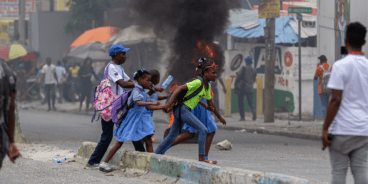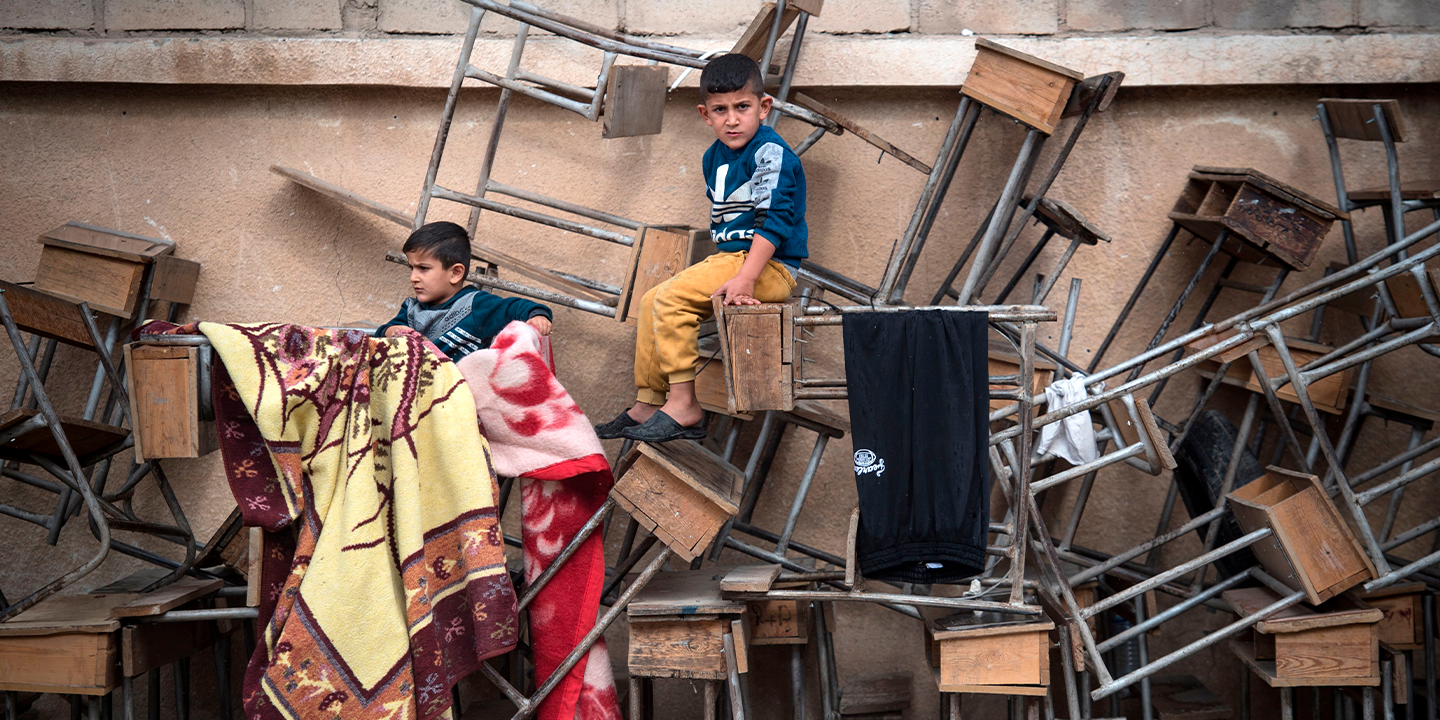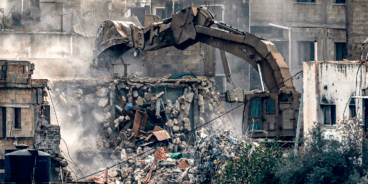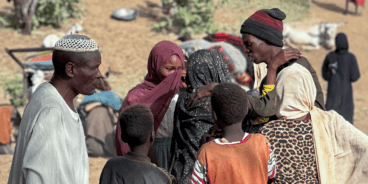

Atrocity Alert No. 354: Children and Armed Conflict and Mali
Atrocity Alert is a weekly publication by the Global Centre for the Responsibility to Protect highlighting situations where populations are at risk of, or are enduring, mass atrocity crimes.
ALARMING SURGE IN GRAVE VIOLATIONS AGAINST CHILDREN IN CONFLICT ZONES
The UN Secretary-General’s annual report on children and armed conflict was released on Tuesday, 27 June, documenting 27,180 verified “grave violations” perpetrated against children in 2022 across 24 different conflict zones and one regional monitoring arrangement. This included over 8,630 children who were killed or maimed, 1,166 cases of sexual violence and 7,622 cases of the recruitment and use of children in armed conflict. The report also documented a 112 percent increase in the number of attacks on schools and hospitals. The UN emphasized that the documentation and verification of grave violations remained extremely challenging due in part to access constraints resulting in underreporting.
The majority of these violations were perpetrated in countries where mass atrocities are ongoing or have recently been perpetrated. Grave violations increased by 142 percent in Myanmar (Burma), 137 percent in South Sudan and 84 percent in Burkina Faso during 2022. The Secretary-General added Haiti and Niger as “situations of concern” given the gravity and number of violations reported in 2022, including recruitment and use, killing and maiming, attacks on schools and hospitals, abduction and denial of humanitarian access.
The Democratic Republic of Congo (DRC) had the highest number of grave violations for a second year in a row, with at least 2,420 children impacted by killing and maiming, abductions, sexual violence and recruitment and use. A total of 1,545 children – some as young as five – were recruited and used by armed forces or groups. According to Save the Children, the number of children killed and maimed by conflict in the DRC has progressively risen since 2018, with the 2022 figure nearly doubling the previous year.
This year’s report is the first to include UN-verified data on grave violations in Ukraine, where the ongoing armed conflict has had devastating consequences for children. The UN verified at least 136 children killed and 518 maimed by Russian armed forces and affiliated armed groups during 2022. Most child casualties resulted from the use of explosive weapons with wide-area effects, such as shelling or rockets. Russian forces were also responsible for 480 attacks against schools and hospitals, more than 25 percent of the global total for the year. Russian President Vladimir Putin and the Commissioner for Children’s Rights in the Office of the President of Russia, Maria Alekseyevna Lvova-Belova, are both wanted by the International Criminal Court for the war crimes of unlawful transfer and deportation of children. The UN also found Ukrainian armed forces responsible for the killing and maiming of 255 children and 212 attacks on schools; however, Ukrainian forces were not included in the annexed list of perpetrators.
Since the Monitoring and Reporting Mechanism for children and armed conflict was established, the Secretary-General’s annual report and its annexes have been useful in deterring grave violations, for enhancing the protection of children and contributing to accountability. New listings include the March 23 Movement armed group from the DRC for killing and maiming children, rape and other forms of sexual violence, attacks against schools and hospitals, and abduction; the so-called Islamic State of the Greater Sahara for killing and maiming in Burkina Faso; the Tatmadaw Kyi, now listed as the Myanmar Armed Forces, for attacks on schools and hospitals and abduction of children; and Russian forces and affiliated armed groups for killing and maiming and attacks on schools and hospitals.
However, several offending parties were once again excluded from the report’s annexes despite UN-verified evidence of their responsibility for grave violations against children. Civil society groups have routinely expressed concerns about the Secretary-General’s failure to include all parties responsible for child rights violations.
Notably, Israeli government forces have never been listed in the annexes despite the UN finding them responsible for over 6,700 child casualties between 2015 and 2020. Despite 3,133 verified grave violations against 1,139 Palestinian children and eight Israeli children in the Occupied West Bank, including East Jerusalem, the Gaza Strip, and Israel, both Israeli government forces and Palestinian armed groups were once again omitted from the report’s annexes. In 2022 the UN verified that Israeli forces were responsible for killing 42 children and injuring an additional 933, and for 110 attacks against schools and hospitals. In 2022 Palestinian groups were also identified as responsible for several grave violations against children, including over 100 killing and maiming cases.
All perpetrators of grave violations against children must be held to the same standard, regardless of whether they are state forces or non-state armed groups. Today, 5 July, the UN Security Council held an open debate on children and armed conflict, during which Council members considered the findings from the Secretary-General’s annual report. Some members and speakers insisted on a consistent and transparent application of the criteria for listing and de-listing parties.
The UN Special Representative of the Secretary-General for Children and Armed Conflict, Virginia Gamba, said, “In the protection of our children, words are a waste of time. We need urgent action to secure their present and provide them with a future free from fear, war, and abuse. Let’s take our responsibilities, we owe that to the children.”
In order to better protect children in armed conflict, all UN member states should implement the Optional Protocol to the Convention on the Rights of the Child, the Paris Principles, and the Vancouver Principles, and abide by the Safe Schools Declaration. UN member states should scale up the necessary resources to fund the protection of children in conflict at the scale and speed required, in line with the growing need.
THE UN’S DECADE-LONG PEACEKEEPING MISSION IN MALI TO ABRUPTLY END
On 16 June the Malian transitional authorities called for the “withdrawal without delay” of the decade-long UN Multidimensional Integrated Stabilization Mission in Mali (MINUSMA). In keeping with the host state’s request, on 30 June the UN Security Council (UNSC) unanimously voted to abruptly end MINUSMA. The withdrawal of approximately 17,400 personnel began on 1 July and will end by 31 December. The UNSC has authorized MINUSMA to – “within its immediate vicinity” – respond to imminent threats of violence to civilians until 30 September. Following the withdrawal of the Mission, the Malian transitional military government will assume full responsibility for the protection of civilians.
The rapid withdrawal of MINUSMA has raised grave concerns regarding the future of civilian protection, as well as independent human rights monitoring and reporting. In the past year, Malian military transitional authorities have continually dismissed allegations of abuse and undermined investigation efforts by the Human Rights Division of MINUSMA. In early 2022 Malian authorities imposed no-fly zones to impede an investigation by MINUSMA into the alleged massacre of at least 500 people in Moura. Government restrictions on MINUSMA’s air and ground operations have also undercut MINUSMA’s capacity to protect populations and take timely interventions.
Despite the presence of peacekeepers, the human rights and protection situation has deteriorated significantly since the start of 2022, with a surge in attacks against civilians by armed Islamist groups and mounting abuses during counterterrorism operations. According to the UN, at least 1,277 people were killed in 2022, representing a 54 percent increase from the previous year. The alarming increase in the number of civilians killed demonstrates that the Malian army remains underequipped to provide adequate protection and has at times – alongside allied mercenaries from the Wagner Group – perpetrated possible war crimes and crimes against humanity.
Since its deployment in Mali in 2013, the protection of civilians has been a mandated task for MINUSMA. Amidst multifaceted security concerns, including several coups and growing activity by armed Islamist groups, the Mission’s operating environment was particularly dangerous. Since the start of the Mission, more than 172 peacekeepers have been killed in malicious acts, making it the deadliest UN peacekeeping mission in the world.
Inadequately managed or rushed departures of previous peacekeeping missions, such as the UN-African Union hybrid peacekeeping operation in Darfur, had devastating consequences for populations and resulted in increased violence against civilians. The withdrawal of MINUSMA from areas where peacekeepers regularly patrolled may prompt armed Islamist groups to further increase their attacks and will likely exacerbate an existing security vacuum.
MINUSMA should create benchmarks regarding the protection of civilians to inform the sequencing of its transition. UN stakeholders should consult civilian populations and civil society about protection needs when developing the transition plan. Malian authorities must fully cooperate to ensure an orderly and safe withdrawal of Mission personnel and assets, as well as allow the National Human Rights Commission to continue documenting rights abuses and respect the mandate of the UN Independent Expert on the situation of human rights in Mali.
Related Content


World Leaders Must Act to End Israel’s Unlawful Presence in the Occupied Palestinian Territory
